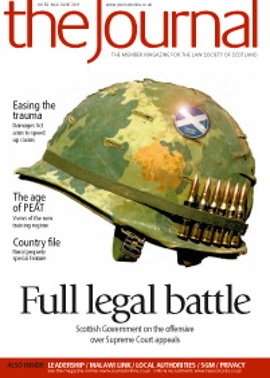The colour yellow

On 5 May 2011, Scotland turned yellow by electing an SNP Government with an overall majority. In its previous term, the SNP was considered to be good for rural interests. So farmers and landowners are probably heaving a sigh of relief. But what can we, as rural lawyers, and our clients expect over the next five years? Some things we know; others can be predicted.
Special treatment
The SNP sees farming as important enough to have merited (along with students) a special manifesto. This contains 25 pledges, most of them practical matters including ensuring support for active Scottish farmers in CAP reform, maximising Scotland’s share of Pillar 1 and 2 funding, streaming of SRDP to address Scottish needs, strengthening the power of food producers and championing “country of origin” labelling at European level. Many of these require co-operation with or lobbying of Brussels and Strasbourg, which demonstrates how many of the policies applying to rural Scotland operate throughout the EU, in which, as we know, the First Minister is demanding a stronger voice.
The farming manifesto includes a pledge to support tenant farmers and new entrants, the latter by establishing a new advisory panel, encouraging succession and letting of land to new entrants, demanding that CAP reform delivers immediate equality of access to new entrants, and working with Westminster to develop fiscal measures. Also, the Government is committed to the changes to the Agricultural Holdings Acts required to complete the package agreed by the Scottish Tenant Farming Forum, begun with the Public Services Reform (Agricultural Holdings) (Scotland) Order 2011.
Consultation on the draft Agricultural Holdings (Amendment) Bill closes on 30 June. It will extend the definition of “near relative” (in the context of a s 25 notice to quit) to include a grandchild, prohibit “upwards only” or “landlord only” rent reviews in new limited duration tenancies, and provide that changes in VAT rates are not variations of rent within s 13(8) triggering a new three-year rent review cycle.
Related issues
Other manifesto proposals which may lead to legislation or regulation include:
- encouraging Westminster to legislate for a supermarket adjudicator;
- supporting integrated land use;
- simplification of the planning process to develop an agri-renewables strategy (part of a wider commitment to continue to improve the system);
- creation of a Scottish Animal Health Strategy;
- making it easier for successors to build a house on the farm.
Perhaps the most welcome pledge of all to farmers is to accelerate the SEARs initiative and further reduce on-farm inspections and bureaucracy by setting up a joint industry/agency working group – i.e. to reduce red tape.
The main manifesto has promises relating to delivery of rural education. There are also commitments to the rollout of superfast broadband in rural Scotland and expansion of 3G coverage Scotland-wide, and a simple statement that rural Scotland must benefit from and participate fully in 4G services. It remains to be seen how this will impact on existing telecoms mast leases. Renegotiation of their terms may be required to realise these aspirations.
There is also a commitment to introduce zero waste legislation during 2011 with a view to its coming into force in 2013. The manifesto pledges a total ban on organic waste going to landfill by 2017, a maximum 5% of waste going to landfill by 2025, and 70% recycling target by the same year.
Up for review
There is, of course, a batch of 2010 and 2011 Acts passed in the previous Parliament which still fall to be implemented, including Historic Environment, Reservoirs, Wildlife and Natural Environment, and parts of the Crofting Reform (Scotland) Act.
Furthermore, the new Government is pledged periodically to review recent legislation more directly affecting rural law. Statutes to be reviewed during this Parliament include:
- Land Reform (Scotland) Act 2003, through a new review group which will presumably build on the proposals by the Centre for Mountain Studies in its 2010 Post-Legislative Scrutiny Report to encourage greater use of access rights and to beef up community and crofting communities’ rights to buy;
- Agricultural Holdings (Scotland) Act 2003 as amended: its effectiveness is to be reviewed within 18 months;
- Climate Change (Scotland) Act 2009: the manifesto pledges to increase the renewables target to 100% by 2020 while maintaining Scotland’s position as an exporter of electricity;
- Wildlife and Natural Environment (Scotland) Act 2011, in particular measures concerning snaring (by 30 December 2016) and wildlife crime (an annual report is to be laid before the Parliament).
And finally, it is reasonable to assume that the Long Leases (Scotland) Bill, which was timed out of the last Parliament, will be reintroduced; and succession is, we suspect, still on the radar following the Scottish Law Commission’s report in 2009.
Prepare for another busy five years!
In this issue
- Breaking new ground
- A&A accounts and abatements
- What price privacy?
- Power struggle
- Rural peace?
- Damages for our times
- Grief revalued
- Up to speed?
- Into Africa
- Expenses review opens with invitation on issues
- Law reform update
- From the Brussels office
- Dundee students join advice network
- The learning curve
- Ask Ash
- Guiding hands
- Marriage made in heaven?
- Email on the spot
- One for the accused to prove
- Going for growth
- A brake on termination?
- The colour yellow
- All change on the croft
- Natural justice in play
- Website review
- Book reviews
- A time of opportunity
- Rural property - Who wants to be a green wellie conveyancer?
- Rural property - Buying and selling: pitfalls and problems
- Rural property - In the taxman's sights
- Rural property - Farm tenancies: more changes imminent
- Now we are 10






